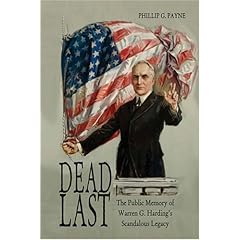Warren Harding, George W. Bush and Barack Obama. Whaat?
 In the movie Gabriel Over the White House (1933) an ineffective, philandering, president is transformed by a near-tragic accident from a party hack into an activist president who tackles the nation’s seemingly insurmountable problems. In this Depression-era film, fictional President Judson C. Hammond is transformed from Warren G. Harding to Franklin D. Roosevelt. The idea of the presidency transforming the man is a common theme in presidential literature and movies. While these sorts of transformations may make for good fiction, they are a historical rarity. As George W. Bush exits the national stage and Barack Obama steps onto the presidential stage, we are watching this process play out before us as we hope to move from Harding to Roosevelt. In some ways, inaugurations, as much as the movies, are about the importance of image to our understanding of the presidency.
In the movie Gabriel Over the White House (1933) an ineffective, philandering, president is transformed by a near-tragic accident from a party hack into an activist president who tackles the nation’s seemingly insurmountable problems. In this Depression-era film, fictional President Judson C. Hammond is transformed from Warren G. Harding to Franklin D. Roosevelt. The idea of the presidency transforming the man is a common theme in presidential literature and movies. While these sorts of transformations may make for good fiction, they are a historical rarity. As George W. Bush exits the national stage and Barack Obama steps onto the presidential stage, we are watching this process play out before us as we hope to move from Harding to Roosevelt. In some ways, inaugurations, as much as the movies, are about the importance of image to our understanding of the presidency.
George W. Bush and his allies have launched a legacy campaign. In a series of interviews and articles, President Bush and those associated with his administration have argued that despite current low poll numbers they will be redeemed in history. Their argument boils down to two basic points. One, they enumerate a variety of policy successes. Two, they argue that some policies (chiefly related to Iraq) that currently seem like unpopular failures, over the long-term, will prove to be successful. The end result will be the redemption of the Bush legacy. They might be right. There are a few instances of historians, the public, or both changing their minds about a past president. There does seem to be a certain willingness on the public’s part to let bygones be bygones for former presidents as long as they stay out of the political arena.
However, as of this writing, the central legacy debate playing out in the media is of whether Bush is the worst president of all time; is the better comparison with Herbert Hoover or Warren Harding? A Washington Post/ABC poll finds Bush with a 33 percent public approval rating, noting that in the post-World War II period only Richard Nixon and Harry Truman have had lower numbers. Similarly, the pollster reports that the public’s mood on the direction of the country and the state of the economy are “the most negative assessment in more than 23 years of Post-ABC polling.”
In contrast Barack Obama enters the presidency evoking Abraham Lincoln and Franklin Roosevelt, two men of different parties who are regularly ranked as great presidents. The Washington Post reports enormous crowds waiting to see Obama as he retraces Lincoln’s route to the White House while traveling in a Depression-era railcar. Again history seems to be a force of nature as the Post reports: “On the final leg of a two-year road trip, Barack Obama rode into Washington on Saturday in an antique caboose with the contented look of a man convinced he was arriving at his rightful destination.”
No president enters the White House expecting to fail. Neither Harding nor Hoover entered the White House planning on going down in history as failures. After his death in office Harding was compared with Lincoln for his ability to bring people together. Hoover spent years defending his record as president. The irony is that Bush, like Obama, realizes that history, in the omnipresent third person, often rewards the activist president, the president who, as Bush likes to phrase it, did not play “small ball.” As he transitions into his post-presidential years, Bush is announcing the creation of a “Freedom Institute” in Dallas that will be a combination library, museum, and public-policy think tank. Margaret Spellings, the outgoing Secretary of Education, says that center will focus on “game-changing” policies and decisions.
Obama, of course, is just starting to make decisions as president. The incoming Obama administration has brought into the public light a debate over the effectiveness of the New Deal, but at this moment in time, he embodies our hope for transformation. While movie makers, film makers and writers often use the deus ex machina to explain when the man becomes the president, the prosaic transition from Bush to Obama is one of the more important changes to the country and the democratic process. It remains to be seen if Bush will be able to refurbish his reputation and whether Obama will be the next Lincoln.